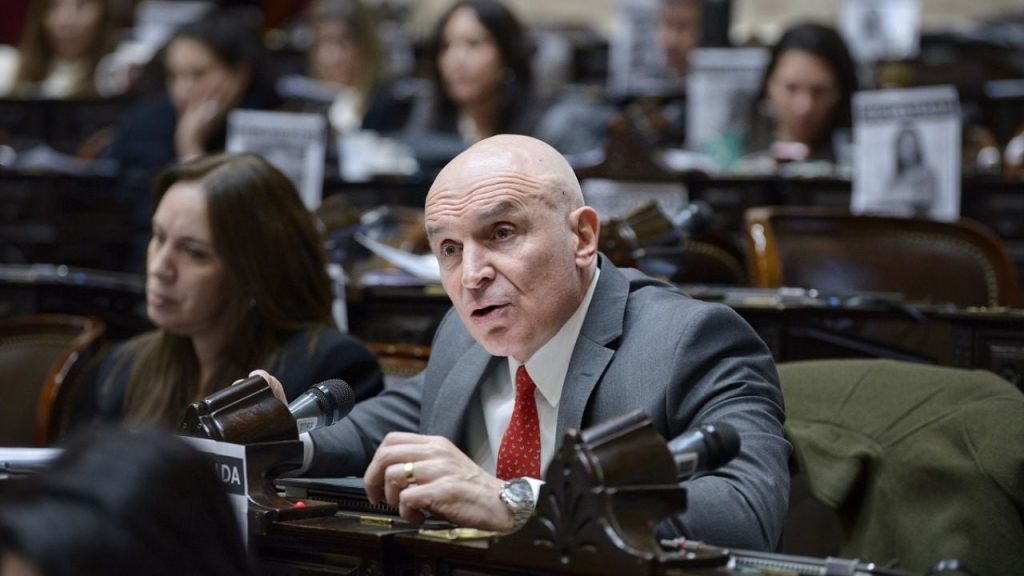The Pit-Cnt launched a campaign to reduce the working week to 40 hours with pay for 48, and subsequently a negotiation process by branch and sector of activity to define the scope and application of this measure.
Present at the launch were the president of Pit-Cnt, Marcelo Abdala; the Minister of Labor and Social Security, Mario Arizti; the general director of Inefop, Pablo Darch; the president of Cofe, Joselo López; the director of the Cuesta Duarte Institute, Milton Castellano; and the Saberes en Acción/Icudu team, made up of Alejandra Picco, Pablo Blanchard and Federico Araya, who presented a technical report on the benefits that this measure would have.
Abdala said that the proposal would have several positive effects, based on experiences that have been recorded in other countries, such as “improvements in occupational health, a tendency to do more sport and to stop smoking; in addition, it would allow the gender gap to be reduced by enabling a greater sharing of unpaid work.”
“The proposal to reduce the working day is an initiative that we presented, but that also has the technical solvency of a study, not only by the Cuesta Duarte Institute, but by technicians and academics from the University of the Republic, who show that it is perfectly possible and that it is good for people because, in addition, it has a positive impact on productivity,” said Abdala.
He said that it will be a law that they will promote with legislators from all political sectors and that they will hold meetings with the different presidential candidates.
For his part, the Minister of Labor and Social Security, Mario Arizti, said that the redistribution of the working day is something that they have always advocated.
“I recognize that the issue of shorter working hours is a topic of global debate, which is always on the table. It is a topic to be discussed, we must not refuse to discuss working hours as a whole,” said the minister.
He added that legislation is necessary, but at the same time, “space must be left for collective bargaining,” which, he explained, is what is currently happening, “where many sectors, through collective bargaining, distribute their working hours and adjust to the reality of that sector or that company.”
The minister agreed to the distribution of hours, that is, that a worker works more hours on some days of the week and then can have, for example, Friday off and thus achieve a longer rest.
“Today there are collective agreements that establish this type of distribution of working time and that allow for the reconciliation of family life with work life and with the production of the company itself,” said Arizti.
He added that the number of hours can be set per week, although he said that there needs to be weekly limits on the number of hours to be worked.
“We need to analyze all the aspects of the proposal because one of the negative points that has occurred in other countries is that the working day is reduced and then a second job is sought. That is why the issue must be studied carefully and debated,” said the minister.
During the meeting, researchers from the Saberes en Acción Project, an initiative of the Cuesta Duarte Institute (Icudu) and co-financed by the National Institute of Employment and Vocational Training (Inefop), presented a technical report on the research carried out.
The study, which analyses various international experiences on the reduction of working hours, reveals that one of the recurring arguments used by governments is the positive impact on the well-being of workers.
According to the report, from a theoretical point of view, the extension of the working day can affect health directly, due to harmful effects that arise from the activity (such as physically exhausting workloads), or indirectly, for example, by affecting income and the time available to be at home.
They also claim that reforms that reduce working hours can have differential impacts by gender and can help reduce gaps.
In terms of hourly productivity, research has found that reducing the workday increases productivity, which partially offsets the increase in wage costs that a reduction in workday implies for companies.
According to data from the National Institute of Statistics (INE), the total number of employees in 2023 amounted to 1,211,000, of which 523,000 worked more than 40 hours a week. Within this group, 267,000 employees worked less than 48 hours, while 158,000 worked 48 hours and 98,000 had a work regime that exceeded 48 hours a week. Abdala explained that all of them will benefit from the reduction in working hours.


















